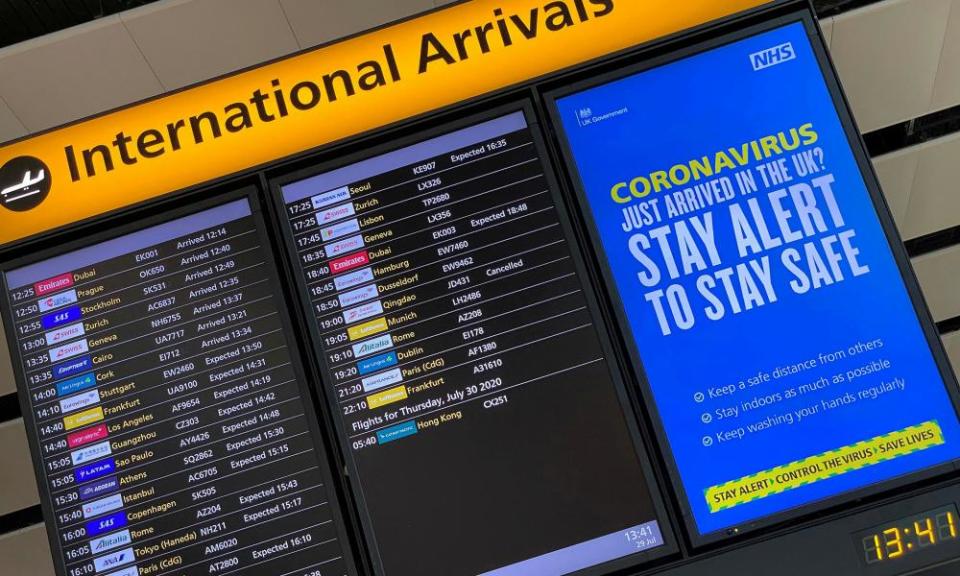Double-jabbed US and EU travellers can avoid England quarantine, ministers decide

Double-vaccinated travellers from the US and most of Europe will have their jab status recognised, meaning they can avoid quarantine when arriving in England.
The Guardian revealed on Tuesday that the government was poised to announce a significant loosening of international travel restrictions to let millions more people visit friends and family in the country, as well as boost the struggling tourism and aviation sectors.
After a meeting of senior ministers on Wednesday, the go-ahead was given to treat those who have been fully inoculated in the US and Europe the same as British residents, coming into force from Monday 2 August at 4am.
Currently, only those who have had two vaccine doses administered by the NHS are eligible for a “Covid pass” they can show at the border in England, meaning they are allowed to avoid isolating for up to 10 days if travelling from an amber list country – so long as they test negative before departure and again within two days of arriving.
The move came on the day the UK saw a rise in coronavirus cases after a week of consecutive declines. On Wednesday, 27,734 new cases were reported, up from 23,511 the day before. There were also 91 deaths recorded, down from 131.
The transport secretary, Grant Shapps, confirmed the changes would apply to people who are fully inoculated with a vaccine approved by the US and EU medicines regulators, and children who normally live in America and Europe – regardless of whether they have been jabbed or not.
Those in Europe – which includes the EU, plus Norway, Iceland, Switzerland, Lichtenstein, Monaco, Andorra and Vatican City – will need to show their “digital Covid certificate”, while people coming from the US can show the paper card they were given after being vaccinated. The only exception is for people arriving from France, who still have to quarantine on arrival.
Shapps said it was a “great stride” towards reuniting people and unlocking business travel. He also confirmed that international cruises would soon be allowed to resume and that the requirements for some critical workers who do not leave their vehicles when crossing the border into England will be relaxed.
default
Given health is a devolved matter, it will be up to the governments in Edinburgh, Cardiff and Belfast to follow suit. The Guardian understands the Welsh administration is likely to adopt the same policy.
While many EU countries accept the UK’s Covid pass as proof of vaccination and allow double-jabbed Britons into them, the US said earlier this week its tight restrictions would stay in place.
Despite the agreement at the G7 last month by the British prime minister, Boris Johnson, and the US president, Joe Biden, to set up a taskforce to restore travel between both countries, there has been no breakthrough – so the UK has ploughed ahead without a reciprocal agreement in place with the US.
The White House press secretary, Jen Psaki, said on Monday that any non-US citizens who have been in the UK 14 days before their flight would be barred because of the prevalence of the Delta variant, while US citizens would be advised not to travel to the UK.
Pressure had been growing on the UK government to ease restrictions on those in other countries who are fully vaccinated, with ministers facing criticism for having more stringent controls in place at the border currently than there were last summer.
Labour earlier criticised the easing of restrictions, with the party’s deputy leader, Angela Rayner, calling the move “reckless” and warning it could lead to the importation of more variants like the Delta strain that are more transmissible and could wreak havoc.
Prof Christine Pagel, director of the Clinical Operational Research Unit at UCL, also told the Guardian that vaccinated people can still catch Covid and have been proved to have seeded it in other countries, including Israel and Iceland.
“By definition the variants we are most worried about are the ones that infect vaccinated people,” she said. “So making vaccinated people exempt from quarantine doesn’t make any sense if variants are what we are most worried about.
“If the current reduction in cases here is real and if we’re actually in a good place, then why would we risk it?”
Pagel also warned that travel restarting between the US and EU would mean that “a variant that emerges anywhere will spread everywhere”, which was a worry.
“We should be taking advantage of the fact that we are an island and having much more control over potential new variants coming in,” she said.
Sir John Bell, regius professor of medicine at Oxford University, also told BBC Radio 4’s World At One it was “self-indulgent” for the government to be focusing on what freedoms to give to fully vaccinated people while the vast majority of people in some poorer countries do not have access to jabs.
He said: “If you want variants, you’ve got the perfect storm for that, and it is not in Watford – it is in Zimbabwe and Rwanda and South Africa.”

 Yahoo Finance
Yahoo Finance